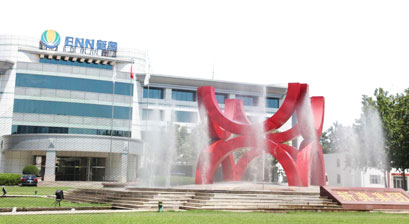
ENN Group is a Chinese conglomerate that was established in Langfang, Hebei Province in 1989 with a clear mission to create a modern energy system and enhance people's quality of life. Initially focused on urban gas provision, ENN has since expanded its operations to encompass the entire natural gas industry, including production, distribution, trade, storage, and engineering. ENN has also diversified into other sectors, such as real estate, tourism, culture, and health, to provide premium living experiences.
In the age of intelligence, ENN actively promotes intelligent transformation with a focus on providing quality, low-carbon, and intelligent products to meet the needs of family and business customers. It has developed an intelligent production and operation platform, as well as industry-specific intelligent platforms that leverage IoT sensing, big data, and robotics to create integrated intelligence in perception, cognition, and behavior.
Currently, ENN has a global workforce of over 40,000 employees and its operating revenue reached $21.4 billion in 2024. ENN offers energy services to nearly 31 million households and over 270,000 enterprises in 22 provinces in China. The company has four listed companies, including ENN Energy(02688.HK), ENN Natural Gas(600803.SH), ENC Digital Technology(603869.SH)and Tibet Tourism(600749.SH).
As a subsidiary of ENN Group, ENN Energy Research Institute is dedicated to developing sustainable, reliable, and economically viable solutions to the world’s energy challenges. Since its establishment in 2006, the institute has achieved significant technical innovations and scientific advances in coal-based low-carbon energy technologies. Today, our research focuses on compact fusion—a technology poised to redefine the future of energy.
The Institute hosts several key research platforms, including the Overseas High-level Talent Innovation and Entrepreneurship Base, the International Scientific and Technological Collaboration Base, and the Hebei Key Laboratory of Compact Fusion. Our team of 300 scientists and engineers collaborates across disciplines to tackle critical energy issues of national and global significance. To date, we have taken part in more than thirty state-funded R&D programs and secured over 1,900 patents by the end of 2024.
As China’s first private enterprise committed to commercial fusion energy, ENN is leading the way in developing neutron-free, cost-effective fusion power. Since 2017, our research has centered on spherical torus proton-boron fusion—a clean and safe route to virtually limitless energy. Our target is to demonstrate proton-boron power generation by 2035.
Through two generations of spherical tokamak devices, we have made rapid progress in both theoretical understanding and engineering implementation. Our EXL-50 device, commissioned in 2019, set a world record by achieving a 170 kA non-inductive current drive. The upgraded EXL-50U broke new ground in 2024, reaching a plasma current of one million amperes and sustaining a 1.2 tesla magnetic field for several seconds—placing it among the world’s most advanced spherical tokamaks. We are now constructing our next-generation EHL-2 device, scheduled for completion in 2027, to overcome key challenges on the path to proton-boron fusion.
We are convinced that open collaboration is key to solving global energy challenges. By partnering with more than 70 institutions across the globe and sharing experimental access and data, we are harnessing collective intelligence to accelerate progress. Together, through world-class research facilities and collaborative platforms, we are bringing the vision of transformative clean energy to life.
Achieved 1MA plasma discharges using hydrogen-boron fuel, with an electron temperature up to 40 million degrees Celsius.
TF coils operated stably for 1.6 seconds at a central magnetic field of 1.2T
Officially commissioned ENN Xuanlong-50 Upgrade (EXL-50U), an advanced spherical tokamak device.
Hosted the 2nd Workshop on Integrated Simulation of Magnetic Confinement Fusion.
Participated in the Inaugural Private-Public Fusion Workshop hosted by ITER.
Published landmark academic papers on proton-boron fusion technology, outlining ENN’s scientific roadmap.
Held the 2nd International Workshop on the Proton-Boron Fusion Reaction and Applications.
Achieved a major breakthrough with EXL-50U, successfully conducting 500 kA plasma current experiments—a critical milestone for high-performance fusion plasmas.
Established the Nankai-ENN Cognitive Technology Innovation Center Fusion AI Lab, integrating artificial intelligence into fusion research.
Represented China’s private fusion sector at the Inaugural Ministerial Meeting of the IAEA World Fusion Energy Group.
Completed the physics design of He-Long 2 (EHL-2), ENN’s next-generation spherical torus device for proton-boron fusion research.
Launched the 1st International Workshop on the Proton-Boron Fusion Reaction and Applications.
Organized the 1st Workshop on Integrated Simulation of Magnetic Confinement Fusion, advancing computational fusion research.
Signed a strategic cooperation agreement with the Southwestern Institute of Physics (SWIP), strengthening fusion R&D collaboration.
Held the 3rd Academic Committee Meeting of the Hebei Key Laboratory of Compact Fusion.
Hosted the Annual Conference on Integrated Engineering Design of China Fusion Engineering Test Reactor (CFETR) & Fusion Reactor Design Workshop, promoting collaboration in fusion engineering.
Organized the 2nd Academic Committee Meeting of the Hebei Provincial Key Laboratory of Compact Fusion.
The Hebei Key Laboratory of Compact Fusion officially passed its construction acceptance review, as announced by the Hebei Provincial Department of Science and Technology.
Successfully completed the construction of ENN Xuanlong-50 (EXL-50), China’s first medium-sized spherical tokamak fusion experimental device.
Held the 1st Academic Committee Meeting of the Hebei Provincial Key Laboratory of Compact Fusion.
Hosted the International Symposium on Compact Fusion Technology, bringing together global experts to advance compact fusion solutions.
The carbon-free energy technology roadmap was released in conjunction with the compact fusion research project.
Two national standards for upgraded coal were approved with ENN being selected by the editorial board.
ENN’s Deep Geothermal Energy Program was initiated and the primary infrastructure for Catalytic Coal Gasification and Hydrogasification was established.
ENN broke ground on Catalytic Coal Gasification and Hydrogasification demonstration facility in Inner Mongolia.
The Hebei provincial government awarded ENN the “High-level Innovative Team”.
The Ninth International Exhibition of Inventions bestowed the Invention and Entrepreneurship Golden Award to Coal Catalytic Gasification Technology.
The ENN Ubiquitous Energy Machine was connected to the power grid at Yongtangqin station.
The “400 tons/day Process Design Package for Industrial Hydrogasification” and “Municipal Sludge and Hazardous Waste Treatment Using Supercritical Water” earned Hebei Province’s Certification of Scientific and Technological Achievement.
Our filed patents reached 1000.
Coal Gasification Technology earned the Certification of Scientific and Technological Achievements by Hebei Province and ENN Power Technology was established to commercialize micro-turbine technology.
ENN Environmental Protection Co., Ltd was founded to commercialize Supercritical Water Oxidation Technology.
The State Key Laboratory of Coal-based Low Carbon Energy was accredited by the Ministry of Science and Technology.
The pilot facility for Catalytic Coal Gasification achieved continuous operation.
ENN was bestowed the Innovation and Entrepreneurship Team by the organizer of Hebei’s Giant Plan, a talent sponsor program initiated by the Hebei provincial government.
ENN Energy Eco-city went on-line.
The Hebei government authorized ENN to become an Academic Workstation and its Clean Energy Innovation Team was awarded for excellence from the 11th Five-Year National Science and Technology Plan of China’s Ministry of Science and Technology.
ENN became an accredited Innovation and Entrepreneurship Base for High-level Overseas Talents.
The State Key Laboratory of Coal-Based Low-Carbon Energy was approved to break ground.
ENN proposed the “Ubiquitous Energy Internet” concept.
The Coal-Based Clean Energy Production and Thin-Film Solar Cell Technology earned the Certification of Scientific and Technological Achievements from Hebei Province.
ENN developed high-efficiency microalgae breeding technology in conjunction with establishing the first industrial algae seed base.
ENN became a State-Accredited Enterprise Technology Center.
ENN became a founding member of the "International Scientific and Technological Cooperation Base".
ENN successfully debuted at the Shanghai World Expo.
ENN broke ground on thin-film photovoltaic panel production.
The no-shaft underground coal gasification project was initiated.
ENN in partnership with the China University of Petroleum established a Masters and Doctoral Graduate Co-Cultivation Workstation.
The ENN Energy Research Institute was established.
ENN was authorized to become one of the postdoctoral work stations by the Ministry of Human Resources and Social Security of China.
ENN was authorized to become one of the Hebei Provincial Enterprise Technology Centers by the Hebei government.

Dr. Minsheng LIU received his Ph.D. in chemical engineering from Tsinghua University. He joined ENN in 2007 and has since been dedicated to various R&D activities, including microalgae bio-energy, energy storage, and fusion technologies. Currently, he serves as the President of ENN Energy Research Institute and the Director of Fusion Technology R&D Center. In these roles, he is responsible for planning, directing, and coordinating all aspects of internal research efforts and collaborations with academia and external R&D partners.
